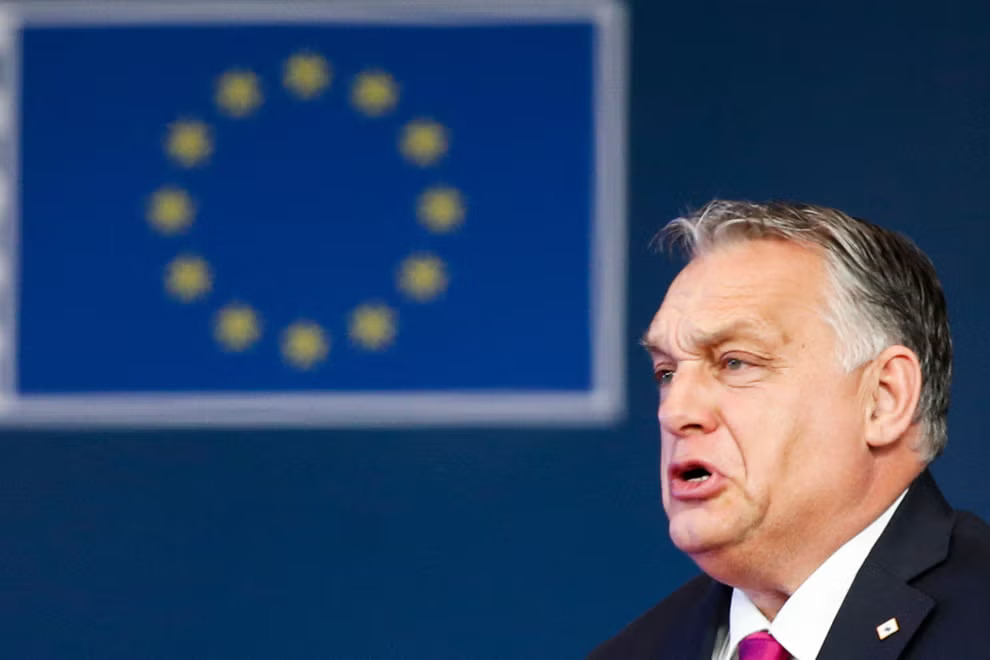Following the large-scale casualties of World War II, the human condition was at its trough. Some 75 million lost their lives, and a similar number of people were forced to flee their home countries. Consequently, the European Union (EU) formed, intended to create a coalition that negotiates intercontinental peace in the midst of conflict. However, the Russia-Ukraine conflict has thoroughly undermined the EU’s unity despite neither of the war’s two main participants being formal members of the bloc. Namely, Ukraine-adjacent Hungary has been in the center of controversy as one of the only members of the EU actively maintaining its alliance with Russian President Vladimir Putin and supporting his invasion efforts. Such factionalization and internal tension within the bloc pose a threat to a unified response by the EU against unjustified warfare. In conjunction with political instability, Hungary’s membership in the North Atlantic Treaty Organization (NATO) also threatens subterfuge in terms of potential military responses. Thus, diverging loyalties and fragmented action will take precedence over unity, causing unnecessary conflict to prolong itself.
Hungary, under the leadership of Prime Minister Viktor Orbán, has pursued a series of actions to maintain its alliance with Putin and support Russia’s invasion of Ukraine, thereby hampering a unified European response. Hungary has consistently opposed EU sanctions against Russia, arguing that they would harm Hungarian and European economic interests more than they would impact Russia. Budapest has also sought exemptions from EU measures targeting Russian energy, securing for itself continued access to Russian gas and oil, which is critical for Hungary’s energy security but undermines efforts to reduce European dependency on Russian energy. Furthermore, Hungary has used its veto power within the EU to block or delay joint EU statements and actions against Russia, challenging the bloc’s ability to present a united front.
Hungary’s position has caused friction with other EU member states and the United States, highlighting the complexities within the EU regarding how to respond to Russia’s actions in Ukraine. Hence, pushing for reduced sanctions on Russian energy, refusing the use of Hungarian land to deliver weapons to Kyiv, and voting to delay financial aid to Ukraine have all been tools by which Hungary has undermined unified action. Together with these maneuvers, Orbán has called for an immediate ceasefire and voiced fierce opposition to the possibility of Ukraine obtaining NATO membership.
“There is no problem with the so-called Ukraine fatigue issue. We have Orbán fatigue now in Brussels,” Polish Prime Minister Donald Tusk stated to reporters shortly after Orbán, after sustained criticism, finally dropped his threat to veto a $54-billion EU aid package for Ukraine. “I can’t understand. I can’t accept this very strange and very egoistic game of Viktor Orbán.”
Hungary’s stance within the EU and its relationship with Russia can be traced to a complex interplay of historical, political, and economic factors. The history of Hungary’s relations with Russia is characterized by episodes of both conflict and cooperation. Notably, Russian forces played a pivotal role in suppressing the Hungarian uprising against the Habsburg Empire in 1848-49 and the Hungarian Revolution against Soviet control in 1956. Post-1991, as Hungary transitioned away from Soviet influence after the dissolution of the Soviet Union, its relationship with Russia evolved considerably. In recent years under Orbán, Hungary has pursued an “Eastern opening” policy, which has led to frequent and prominent bilateral meetings with Putin. Domestically, Orbán has gained notoriety for dismantling checks and balances within Hungary, creating a political environment with striking similarities to Russia’s, including significant control over media and the Internet by loyalists to the ruling party.
Despite these shifts away from democratic political procedure, public opinion in Hungary towards Russia remains complicated. As of 2023, roughly half of Hungarians believed that U.S. and EU sanctions on Russia should be decreased. Nonetheless, while a portion of the population views Russia as an important strategic partner, the majority of Hungarians still support the country’s integration with Western institutions such as NATO and the EU. More specifically, about 10% of Hungarians believe in the former. Yet even in the face of this pro-Western public opinion, Orban has consistently supported the cutback of Russian sanctions.
A major driving factor for Hungary’s tight-knit relationship with Russia, despite its official loyalties on paper lying against them, is its dependency on Putin’s resources. In particular, many Hungarian nuclear power plants have been financed by Russian companies, and during the COVID-19 pandemic, Russia was the first to offer Hungary its breakthrough vaccine. In order to continue receiving benefits, Hungary will have to navigate a fine line between the EU and Russia.
But while Hungary is only one country out of 27 in the EU and one of 31 members of NATO, its deviation from a firm, reprimanding attitude against Russia threatens to undercut a unified European response to the eastern war. Although on a practical level, one vote does not always change outcomes in terms of support toward Ukraine, Hungary’s continual resistance will be a thorn in the bloc’s side that demonstrates a weaker collective effort to address this ongoing conflict, particularly for those EU actions which require unanimity. Additionally, its strong, continued advocacy for a merciful stance on Putin’s antics in Ukraine may gradually chip away at the resolve of other EU representatives who may seek a quicker “resolution” to the war that has likely impacted their own country’s economy in negative ways.
From the point of view of Russia, a fundamentally incohesive international response to its hostile war tactics represents an invitation to continue furthering its expansionist aims. In Ukraine, the results have already been, and will continue to be, devastating. According to Ukrainian statistical analysis, an average of 824 Russian soldiers die per day, and more than 30,000 soldiers have died in total in Ukraine. This data excludes civilian casualties. The longer Hungary continues to uphold this rift in the EU, the longer such atrocities will continue to be carried out—with the costs mounting in the form of EU economic struggles, political division, and human lives.
Featured Image Source: The Independent






Comments are closed.